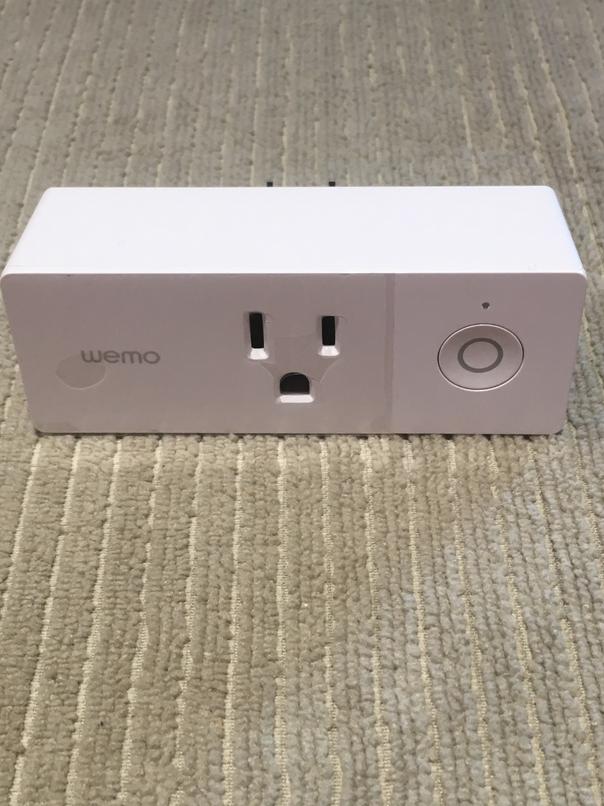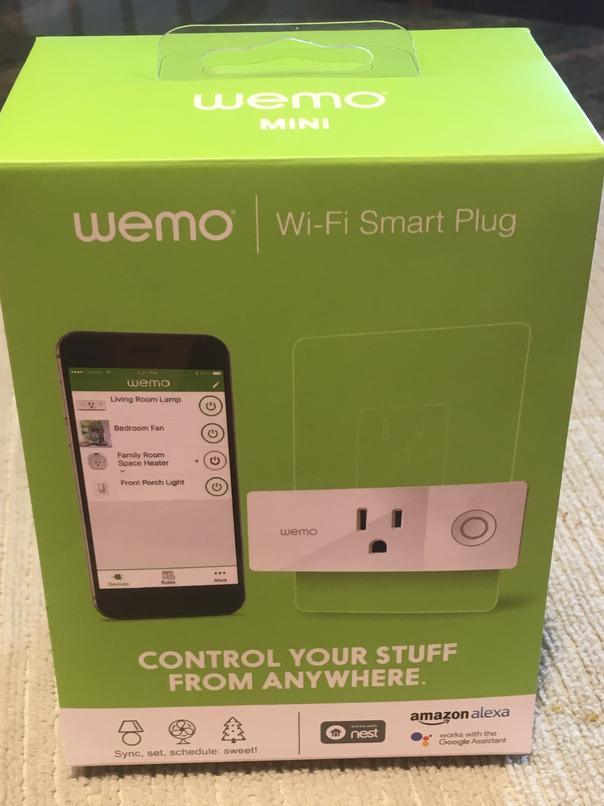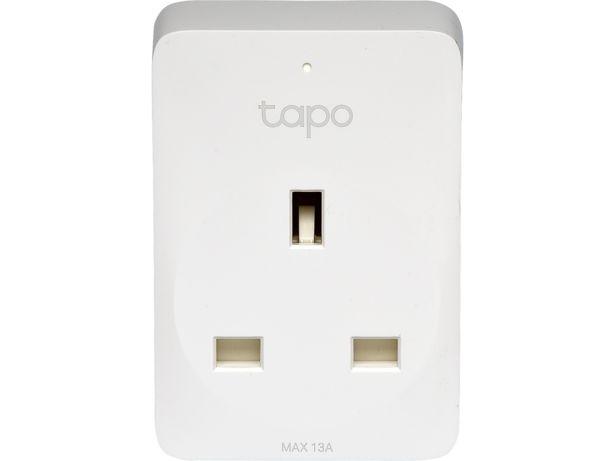Belkin WeMo Mini Wi-Fi Smart Plug review: This itty-bitty, Siri-friendly smart switch is still a best buy
For a few years now, Belkin's WeMo line of smart home switches stood asa reasonably affordable home automation starting point. In 2017, Belkin figured it was time to refresh the lineup.
The main attraction: the WeMo Mini Wi-Fi Smart Plug, which debuted at an asking price of $35 and can now be had for $30 or less. Just like the original WeMo Switch, it'll let you automate anything you plug into it, but like the name suggests, it's a lot smaller than before. That means it won't block off adjacent outlets like the old switches do.
Belkin's WeMo Switch just got a lot smaller
See all photos+8 MoreThe WeMo Mini offers all of the same features asthe original WeMo Switch, including its integrations with platforms and services like IFTTT, Nest, Google Home and Amazon's Alexa -- and now, thanks to a software update in 2018, it'll support Apple HomeKit, too, which means you can control whatever you plug into it using Siri voice commands. It won't track energy usage, though; for that, you'll need to spend a few bucks extra on a WeMo Insight Switch.
Lack of energy tracking aside, the WeMo Mini is still a well-connected smart plug, and a sensible follow-up purchase for anyone who gets an Amazon Echo or a Google Home smart speaker for Christmas, as both will let you turn the plug on and off using voice commands. It isn't perfect -- and it has plenty of worthy new competitors that cost even less -- but at $30, the WeMo Mini is a safe, simple way to dip your toes into the connected home of tomorrow.
The smart home made simple
Smart plugs like the WeMo Mini are some of the simplest and most straightforward connected home gadgets you can buy. Plug one in and then plug something else into it, and you'll be able to turn that thing on and off from your phone, or automate it to turn on and off at specific times.
The most obvious use cases include lamps, space heaters, desk fans, and other small appliances you might want to automate, but there's room for creativity.
For instance, you could plug your entertainment center's power strip into a smart plug, then automatically cut the juice to your AV gear late at night, when you aren't using any of it.
There's even a smart frying pan that can sync with a WeMo Switch to automatically cook your dinner.
Connecting your smart plugs with other smart home gadgets and services opens the door to even more possibilities. WeMo does pretty well here, boasting compatibility with Nest, IFTTT, Apple HomeKit, Google Home and Amazon Alexa, among others.
Switching up the design
It shouldn't be lost on anybody that the WeMo Mini looks a lot like two of its top competitors, theiHome Smart Plug and the iDevices Switch. Both of those Belkin challengers went with small designs that don't block adjacent outlets, making the bulky first-gen WeMo Switch look dated by comparison. Updating the design was a necessary concession for Belkin -- and a clear sign that it's keen on keeping the WeMo Switch competitive on retail shelves.
It's a good move. Afterselling millions of units throughout 2016, Amazon's Echo and Echo Dot smart speakers were both predictably hot sellers during the holiday buying season -- and that meant huge numbers of new potential customers for Belkin's Alexa-ready WeMo hardware.

WeMo was an early partner for the Google Home smart speaker, which made its debut in late 2016, as well. No wonder Belkin wanted its WeMo Switch ready for a fresh closeup.
But staying competitive just about cosmetics. Software matters, too, and that's why Belkin (belatedly) added in Apple HomeKit compatibility for the Mini during the summer of 2018. That countered the clearest advantage of competitors like iDevices and iHome, and cemented the WeMo Mini as one of the most accessible and affordable smart home starting points on the market.
Belkin's other advantage over those two is obviously the $30 price tag. It's a cheaper cost of entry than iHome or iDevices, and closer to what you'll pay for bargain-priced competitors from names like Koogeek, Eufy and TP-Link, where Belkin's brand recognition should serve it well.
Of course, the latest competitor is Amazon itself -- the online retail giant released its own Alexa-friendly smart plug late in 2018 at an asking price of just $25. It's built to pair perfectly with Alexa, but it won't connect with Siri, the Google Assistant or a number of other platforms WeMo supports. That keeps Belkin -- and that $30 price tag -- in a pretty good spot.
About the app
The WeMo Mini uses the same Android and iOS app as existing WeMo devices. I'm holding out hope that Belkin will overhaul that app sometime this year. It's a good-looking piece of software that's pretty easy to navigate, butit suffers from laggy performance -- a quibble that continued as I started testing out the new WeMo Mini.
To sync everything up, you'll follow the app's instructions and plug the WeMo Mini in, then wait a few seconds for it to start broadcasting its Wi-Fi signal. After connecting to that signal, you'll return to the app, where it'll tether the plug to your home network.
In my tests, this pairing process was typically pretty sluggish, often timing out and requiring me to force-quit the app. After launching it back up, the WeMo Mini would always be online and ready to go... but still, not a great first impression.
Things got better from there, though. To Belkin's credit, the app seemed noticeably faster thanthe last time I tested it out for a post from the CNET Smart Home. Unlike in that round of tests, I didn't encounter the problem where my switches were listed as unresponsive.
The WeMo app offers a simple and intuitive rules engine that lets you get your feet wet with home automation. You could, for instance, create a rule that turns a lamp on at sunset, or when a WeMo motion detector catches you walking into the room.
In my home, I have a rule that turns off a space heater every night at 1 a.m. If I ever forget to turn it off, WeMo will remember for me and keep it from running all night. Most importantly, the app makes it really easy to create those kinds of automations.
Syncing up with the Amazon Echo smart speaker was a cinch, too. Once the plug is up and running on your home network, just ask Alexa to discover new devices. Within seconds, she'll detect the WeMo Mini and add it to her list of supported gadgets, and you'll be able to tell her to turn it on and off using whatever name you picked for it in the WeMo app.
Commands like these worked perfectly in my tests, and in my own home, where I've regularly used an Amazon Echo to turn a lamp plugged into a WeMo Switch on and off for over a year now.
Controlling the switch using the Google Home smart speaker, with which Belkin's WeMo gear will soon enjoy native compatibility, should be just as easy once that integration is up and running. For deeper automated controls, it's fairly simple to connect your WeMo gear with the free online service IFTTT, too.
And remember, if you're turning your switches on and off with voice commands and automations like these, then you'll rarely need to open the app at all. I have a set of lights in my home that turn on automatically every night at sunset thanks to a WeMo Switch and an automation rule in the WeMo app. It's worked every night for years now, and I honestly can't remember the last time I've used the app itself. Talk about set and forget.
Let's talk security
With the rise of internet-connected devices in our homes comes some legitimate security concerns, but Belkin's on pretty solid footing here. The company has done an admirable job of responding to potential vulnerabilities with regular firmware updates, and uses standard transport layer encryption for all transmissions to and from WeMo devices.
I spoke with a Belkin representative abouthow WeMo handles security last year -- this is what the company said:
As with a lot of smart home gadgets, a lot of it comes down to how well secured your home network is. Setting strong passwords and then updating them regularly is a good start, and if you need additional guidance,we've got you covered.
Good thing, small package
At just $30 each (or less), the WeMo Mini is one of the most affordable smart plugs on the market, and it's a perfect fit with voice controllers like the Amazon Echo or Google Home smart speakers. Integrations with IFTTT, Apple HomeKit and with the Nest Learning Thermostat let you go even deeper into home automation if you choose.
All of that is why the WeMo Mini is one of my go-to recommendations for folks interested in trying out home automation, but fearful of the complexities and the high cost of buying in. Like the original, it's a smart, simple way to get smarten things up at home, and the new, less obtrusive design is leaps and bounds better than before. Even now, coming on two years since its introduction, it's still an MVP of the modern connected living space.
These smart plugs are the secret to a seamless smart home



